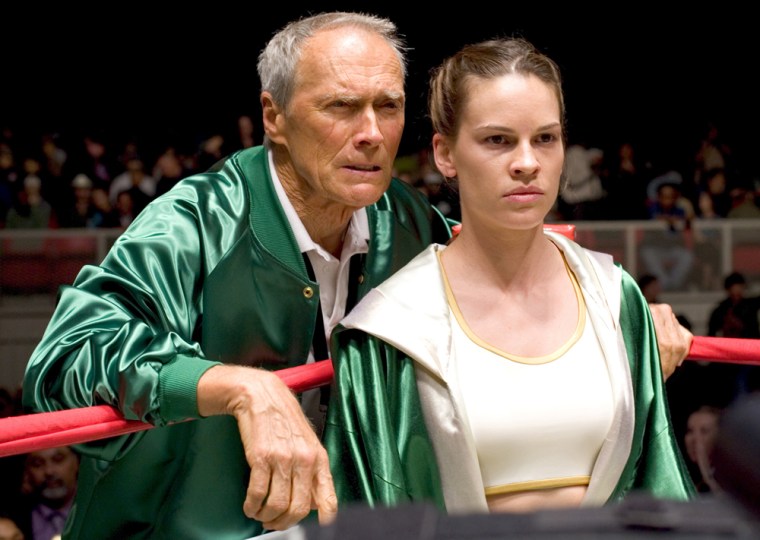(Spoiler alert: This column could ruin the movie "Million Dollar Baby" for you.)
There are two warnings about this column. First warning: Extreme P.C. danger. If your politically correct sensibilities are easily offended, then read no further. This column discusses a topic that really gets people’s ire up, namely attitudes about those with severe disabilities.
Second warning: The ending of the movie "Million Dollar Baby" is revealed. If you don’t want to know the ending, then read no further.
"Million Dollar Baby," starring Clint Eastwood, Hilary Swank and Morgan Freeman, has already won a variety of honors. It has received seven Academy Award nominations including best picture. And well it should. It is a fine movie that offers a touching view of an evolving relationship between an aging fight manager and trainer, Frankie Dunn, played to the hilt as a craggy, old-school grouch by Eastwood, and Maggie Fitzgerald, a late-to-the-game, white-trash girl who has seized upon boxing as her ticket to self-satisfaction. She is played with great poignancy by Swank.
A controversial twist
What has made the movie controversial is the twist it takes at the end. Maggie goes after the championship title against a tough, veteran boxer who is willing to do anything to win. The older pro cheap-shots Maggie after the bell rings and she falls, breaking her neck.
Paralyzed, bed-bound and permanently on a ventilator that pushes air through a tube in her throat, Maggie decides that her life is no longer worth living. She asks Frankie, who has become her closest friend and a surrogate father, if he will kill her. Frankie resists. His conscience and his Catholicism make mercy killing ethically off-limits.

Eventually though he decides that he owes it to Maggie to help her die. He brings a massive dose of adrenaline to the hospital where Maggie lives, disconnects her ventilator, shuts off the machine’s warning alarm and injects her with the drug. She dies moments later. Frankie heads out of town presumably to escape any legal action that might ensue.
The very idea that a severely disabled person might decide that their life is not worth living has driven various folks in the disability advocacy movement, as well as a few highly visible figures on the right-wing talk-show circuit and some in pro-life circles, into a frenzy.
Marcie Roth, director of the National Spinal Cord Injury Association, said she hates the film’s ending because so many people still think that “having a spinal-cord injury is a fate worse than death.”
"Unfortunately," she told The Associated Press, “the movie is saying death is better than disability."
Conservative commentator Rush Limbaugh, who has struggled with addiction to painkillers without feeling the need to defend his moral lapse, could not contain himself from ranting about how bad "Million Dollar Baby" is. He bashed the movie as the product of left-wing, secular thinking.
Michael Medved, another right winger who seems to think Hollywood exists only to find ever more sleazy ways to corrupt the morals of the American public, has seethed about the movie as well. And the Web sites and blogs of pro-life groups across the country are teeming with gripes that Hollywood dare promote a pro-euthanasia movie for so many Oscars.
No Hollywood conspiracy
I rather doubt there is a conspiracy in Hollywood to promote euthanasia. Granted recent cinematic offerings involving Ben Affleck, Jennifer Garner and Jennifer Lopez do make the idea of mercy killing attractive, but this would leave too many agents in Hollywood unemployed. But, seriously, can even Limbaugh expect you to buy the idea that Eastwood is part of some vast liberal conspiracy to get Americans down on disability and all hopped up about euthanasia?
Let's have some straight talk about the disability movement. It is not fair to lump together all forms of disabilities. Not all disabilities are the same. A person who is deaf or has lost a limb or must move about with a wheelchair is not equivalent to someone deciding whether or not to continue life-supporting medical treatment, someone who is paralyzed, incontinent, breathing on a ventilator and "eating" through a tube implanted in the stomach.
Movie audiences can distinguish between these different levels of disability. So could those in the disability movement please stop saying that wondering if you would want to live trapped in a bed forever, only capable of moving your eyeballs, makes you undervalue life with a disability?
Nor is there only one right answer to severe disability. Christopher Reeve, who I know contemplated suicide many times, decided to live on despite his paralysis. But some people, stricken with ALS (Lou Gehrig’s disease), devastating spinal cord injuries, end-stage cystic fibrosis and massive strokes that leave their bodies useless, do not.
Dealing with quality of life decisions about these devastating forms of disability in a thoughtful way — in a movie, book or theatrical presentation — is not selling any kind of value message about disability or, for that matter, promoting a particular ideological agenda. It is using the medium to explore some very tough ethical questions. And that is a very good use of cinema, one that ought to be celebrated not denigrated.
One glaring flaw
Clearly it is not beyond the ethical pale to ask questions about living with a devastating disability and what a person of faith and conscience would do when confronted with a request for help from a person in such a state. That said, how well does the movie actually do when it comes to depicting these issues?
There is one glaring problem in the film, but it is not what the P.C. police or simple-minded, talk-show hosts think it is.
Maggie asks her trainer, Eastwood, to help her die. And he does. But in the real world she would not make such a request of her friend. Instead, she would ask her doctor and nurses to shut off her ventilator. She would ask to be allowed to die, not be killed. The doctors would then have to decide what to do. The ethics of allowing someone to die are thorny enough in their own right, but they are not the ethics of assisted suicide.
Requests to stop life-prolonging treatments are made and honored every day in American hospitals and nursing homes. Jehovah’s Witnesses say no to blood transfusions. Cancer patients ask that their kidney dialysis machines be turned off. Every competent American has the right to stop any and all medical care that they do not want.
"Million Dollar Baby" makes us think we are more powerless than we really are. Those with a severe disability can demand that they be allowed to die — they sometimes do and they sometimes have their life-support stopped.
I don’t know if "Million Dollar Baby" will win any Oscars, but I do know that nothing anyone who is criticizing the movie has said should prevent it from doing so. While the movie makes too much of assisted suicide, any movie that can get Americans thinking about questions of life and death gets my vote.
Arthur Caplan is director of the Center for Bioethics at the University of Pennsylvania.
